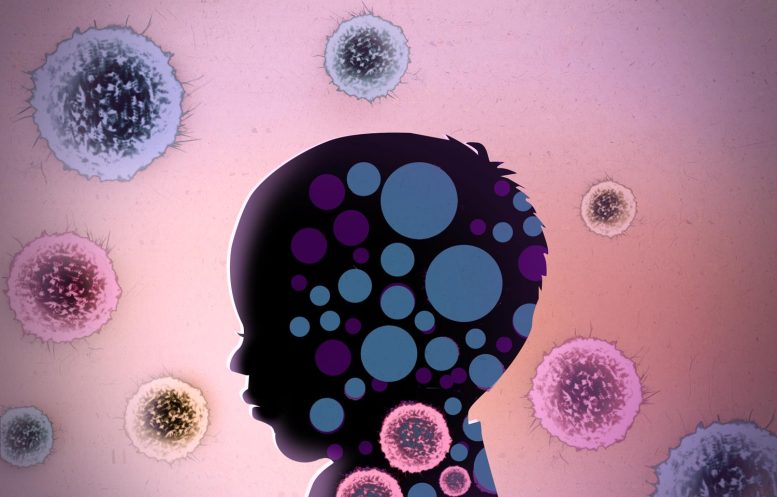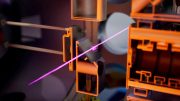
The study suggests that changes in an overactive immune system can lead to autism-like behaviors in mice, potentially influenced by the fetal environment in the womb. Credit: Elaine Hsiao
A newly published study from scientists at Caltech suggests that specific changes in an overactive immune system can contribute to autism-like behaviors in mice and found that the immune system of the mother is a key factor in the eventual abnormal behaviors in the offspring.
Scientists at the California Institute of Technology (Caltech) pioneered the study of the link between irregularities in the immune system and neurodevelopmental disorders such as autism a decade ago. Since then, studies of postmortem brains and of individuals with autism, as well as epidemiological studies, have supported the correlation between alterations in the immune system and autism spectrum disorder.
What has remained unanswered, however, is whether the immune changes play a causative role in the development of the disease or are merely a side effect. Now a new Caltech study suggests that specific changes in an overactive immune system can indeed contribute to autism-like behaviors in mice, and that in some cases, this activation can be related to what a developing fetus experiences in the womb.
The results appear in a paper this week in the Proceedings of the National Academy of Sciences (PNAS).
“We have long suspected that the immune system plays a role in the development of autism spectrum disorder,” says Paul Patterson, the Anne P. and Benjamin F. Biaggini Professor of Biological Sciences at Caltech, who led the work. “In our studies of a mouse model based on an environmental risk factor for autism, we find that the immune system of the mother is a key factor in the eventual abnormal behaviors in the offspring.”
The first step in the work was establishing a mouse model that tied the autism-related behaviors together with immune changes. Several large epidemiological studies—including one that involved tracking the medical history of every person born in Denmark between 1980 and 2005—have found a correlation between viral infection during the first trimester of a mother’s pregnancy and a higher risk for autism spectrum disorder in her child. To model this in mice, the researchers injected pregnant mothers with a viral mimic that triggered the same type of immune response a viral infection would.
“In mice, this single insult to the mother translates into autism-related behavioral abnormalities and neuropathologies in the offspring,” says Elaine Hsiao, a graduate student in Patterson’s lab and lead author of the PNAS paper.
The team found that the offspring exhibit the core behavioral symptoms associated with autism spectrum disorder—repetitive or stereotyped behaviors, decreased social interactions, and impaired communication. In mice, this translates to such behaviors as compulsively burying marbles placed in their cage, excessively self grooming, choosing to spend time alone or with a toy rather than interacting with a new mouse, or vocalizing ultrasonically less often or in an altered way compared to typical mice.
Next, the researchers characterized the immune system of the offspring of mothers that had been infected and found that the offspring display a number of immune changes. Some of those changes parallel those seen in people with autism, including decreased levels of regulatory T cells, which play a key role in suppressing the immune response. Taken together, the observed immune alterations add up to an immune system in overdrive—one that promotes inflammation.
“Remarkably, we saw these immune abnormalities in both young and adult offspring of immune-activated mothers,” Hsiao says. “This tells us that a prenatal challenge can result in long-term consequences for health and development.”
With the mouse model established, the group was then able to test whether the offspring’s immune problems contribute to their autism-related behaviors. In the most revealing test of this hypothesis, the researchers were able to correct many of the autism-like behaviors in the offspring of immune-activated mothers by giving the offspring a bone-marrow transplant from typical mice. The normal stem cells in the transplanted bone marrow not only replenished the immune system of the host animals but altered their autism-like behavioral impairments.
The researchers emphasize that because the work was conducted in mice, the results cannot be readily extrapolated to humans, and they certainly do not suggest that bone-marrow transplants should be considered as a treatment for autism. They also have yet to establish whether it was the infusion of stem cells or the bone-marrow transplant procedure itself—complete with irradiation—that corrected the behaviors.
However, Patterson says, the results do suggest that immune irregularities in children could be an important target for innovative immune manipulations in addressing the behaviors associated with autism spectrum disorder. By correcting these immune problems, he says, it might be possible to ameliorate some of the classic developmental delays seen in autism.
In future studies, the researchers plan to examine the effects of highly targeted anti-inflammatory treatments on mice that display autism-related behaviors and immune changes. They are also interested in considering the gastrointestinal (GI) bacteria, or microbiota, of such mice. Coauthor Sarkis Mazmanian, a professor of biology at Caltech, has shown that gut bacteria are intimately tied to the function of the immune system. He and Patterson are investigating whether changes to the microbiota of these mice might also influence their autism-related behaviors.
Reference: “Modeling an autism risk factor in mice leads to permanent immune dysregulation” by Elaine Y. Hsiao, Sara W. McBride, Janet Chow, Sarkis K. Mazmanian and Paul H. Patterson, 16 July 2012, Proceedings of the National Academy of Sciences.
DOI: 10.1073/pnas.1202556109
Along with Patterson, Hsiao, and Mazmanian, additional Caltech coauthors on the PNAS paper, “Modeling an autism risk factor in mice leads to permanent immune dysregulation,” are Mazmanian lab manager Sara McBride and former graduate student Janet Chow. The work was supported by an Autism Speaks Weatherstone Fellowship, National Institutes of Health Graduate Training Grants, a Weston Havens Foundation grant, a Gregory O. and Jennifer W. Johnson Caltech Innovation Fellowship, a Caltech Innovation grant, and a Congressionally Directed Medical Research Program Idea Development Award.









Severe Birth Trauma, Hypoxic Ischemic Encephalopathy, Oxidative Stress, Mitochondrial dysfunction with resultant immune system compromise and suppression, administration of the full childhood schedule of immunizations, but in particular the use of Live Virus Vaccinations in a severely immunocompromised infant results in AUTISM. The residual effect of the Initial Traumatic Brain Injury sustained by the neonate during the difficult process of delivery will determine the eventual diagnosis. From mild impairment all the way through to Regressive Autism. Which is just one step up from SID (Sudden Infant Death) . The trigger often being the inadvertent administration of a vaccine. Associated with causing the death of the infant, but not the “Root Cause”. Root cause Birth Injury & Associated accumulated injury from the current childhood schedule of vaccinations in a severely Immune Compromised, systemically weaker & sicker infant.
AUTISM RATES NOW AS HIGH AS 1 IN 24 INFANTS BORN, WITH 1 IN 4 PRESENTING WITH A TRIAD OF NEURODEVELOPMENTAL DISABILITY IN THIS GENERATION OF CHILDREN. MODERN DAY “MAN-MADE” EPIDEMIC.
Current Obstetric practices, coupled with the over use of the Medical Products of Vaccines (Which are current INDEMNIFIED AGAINST SPECIFIC LITIGATION FOR INJURY DIRECTLY CAUSED By such products – 1986 ACT Signed into law by President Ronald Regan) are just not conducive to the long term future Health, Development and Well-being of both MOTHER & INFANT.
FACT.